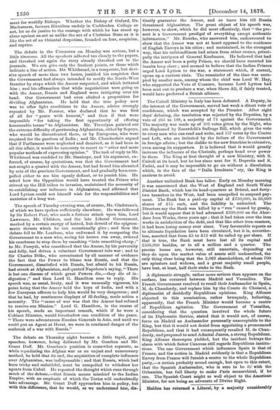The speech of Tuesday evening was, of course, Mr. Gladstone's,
of which we have spoken sufficiently elsewhere. He was followed by Sir Robert Peel, who made a furious attack upon him, Lord Lawrence, Mr. Childers, and the late Liberal Government, marked by a certain energy of hatred, but devoid of the epigram- matic thrusts which he can occasionally give ; and then the debate fell to Mr. Leathern, who enlivened it by comparing the Government to a man who, seeing his horses run away, ordered his coachman to stop them by smashing "into something cheap ;" to Mr. Forsyth, who considered that the Ameer, by his perversity and folly, had driven a reluctant Government into war ; and to Sir Charles Dilke, who accentuated by all manner of evidence the fact that the Power to blame was Russia, and that the Government, dissatisfied with Russia, but afraid to hit Russia, had struck at Afghanistan, and quoted Napoleon's saying, "There is but one disease of which great Powers die,—they die of in- digestion ;" and then Lord G. Hamilton rose to reply. His speech was, as usual, lively, and it was unusually vigorous, his point being that the Ameer held the keys of India, and with a few European officers to help him would be very dangerous ; and that he had, by continuous displays of ill-feeling, made action a necessity. The "cause of war was that the Ameer had refused to receive our Minion." Lord G. Hamilton, in the course of his speech, made an important remark, which if he were a Cabinet Minister, would foreshadow one condition of the peace. "There were adventurous Russian Generals in Asia, and until we could put an Agent at Herat, we were in continual danger of the outbreak of a war with Russia."






































 Previous page
Previous page